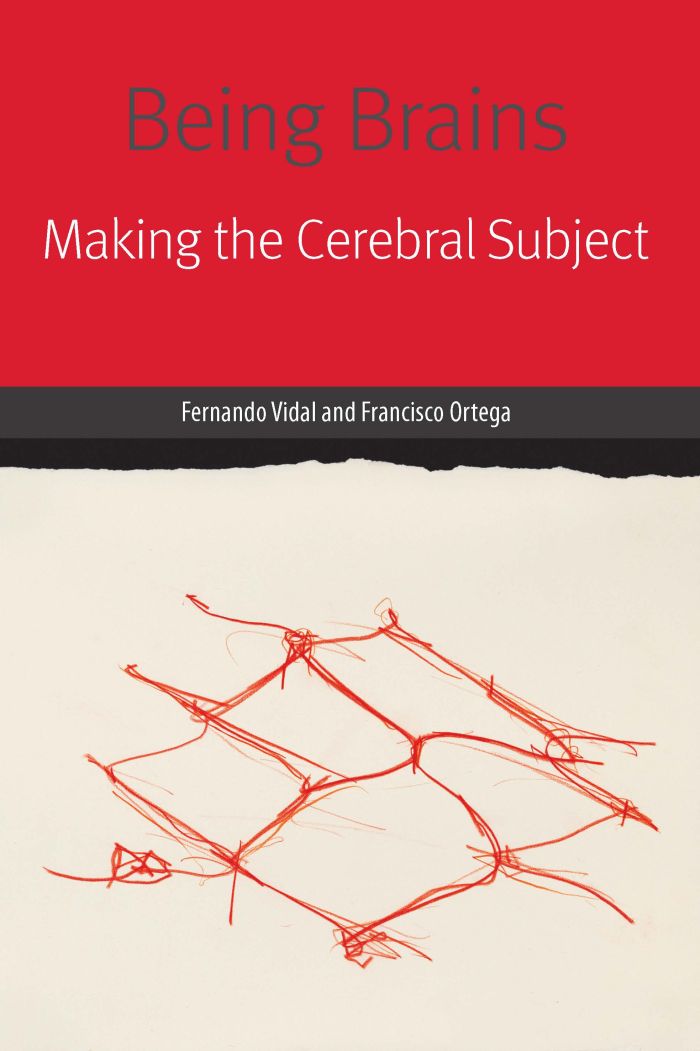Being Brains
Making the Cerebral Subject

This book can be opened with

Being Brains offers a terrifically thoughtful and thorough examination of the ‘neuro-’ turn in various disciplines. On the basis of solid research and subtle analysis, Vidal and Ortega give readers conceptual and critical tools to make sense of widespread claims that studying the ‘neural correlates’ of various activities—art and religion, for instance— will transform or even replace other ways of making sense of what humans do. The book will be a major touchstone in cross-disciplinary discussions about the implications of our contemporary fascination with brains.—John Tresch, University of Pennsylvania
Are we our brains? Have we become ‘cerebral subjects,’ our identities located in nothing more, nor less, than the gray matter in our heads? [The book] masterfully charts the contours of a phenomenon that is at once highly visible . . . and, as an object of study, slippery and elusive in part because it’s so deeply imbricated into the fabric of our everyday lives. Being Brains is a model of how to do intellectual history, argued carefully, precisely, and close to the evidence while at the same time making bold claims that decisively upend conventional understandings of relations between science and the contexts in which it is practiced. I especially appreciated [the authors’] alertness to everyday ontologies and to the ways in which individuals seamlessly weave together different understandings of mind, brain, and self—drawn from a range of scientific and popular sites—in fashioning their identities; it’s a rare account as sophisticated as theirs on this issue. . . . A model of engaged scholarship—and a pleasure to read.—Elzabeth Lunbeck, Harvard University
“In Being Brains: Making the Cerebral Subject, Fernando Vidal and Francisco Ortega argue that the ideology of ‘brainhood,’ meaning the idea that we are, in essence, our brains, predates the sophisticated research methods or precise knowledge of brain structures that characterize contemporary neuroscience. Indeed, contemporary brain science implicitly draws on a modernist concept of the brain as author of the individual and ruler of the body as justification for continued investment in research programs and equipment. That these efforts proceed in the absence of results that provide other than correlational evidence of relations between what happens in the brain and what people feel, think, and do, will never serve as an argument for redirecting scientific attention from brains. This is because the claim that brains rule bodies is a central organizing belief, not a research finding.”—Chloe Silverman, author of Understanding Autism: Parents, Doctors, and the History of a Disorder
[T]his is an interesting, informative, and provocative book that convincingly illustrates how widespread the view that we are essentially our brain is, and that also provides a multi-faceted critique of this view and its implications.—History and Philosophy of the Life Sciences
Without discrediting neuroscience and research on the brain, its operations, and their relation to psychic phenomena, Vidal and Ortega radically critique the neuro-disciplines’ claim that this knowledge would form a comprehensive basis for understanding the human. The neurosciences fundamental claim that self, person are essentially brain simply is, according to Vidal and Ortega, beyond the reach of the empirical as this has always to compromise human, social or cultural phenomena to the ‘dictatorship’ of some experimental method. Long live the humans sciences!—Social History of Medicine
Fernando Vidal and Francisco Ortega have been writing about the “cerebralization of the self,” both collaboratively and individually, for almost two decades. Their book is a welcome addition to the recent flurry of works that critically examine the rise to prominence of the neuro-sciences in neoliberal democracies... a powerful reminder why we—historians, consumers, advocates, patients, or anthropologists of the neuro— should remain skeptical of grand proclamations and promises about resolving the mystery of life and consciousness.—ISIS Review
Being Brains is a milestone in the critical literature on the neuro-turn and of the history of the neurosciences. The book is a thorough, well-informed and consistent analysis of contemporary cerebral subjectivation, in a vast number of fields. Due to its inter- and cross-disciplinary edge, the book is likely to engage in a beneficial dialogue with a larger audience of psychiatrists, psychologists, neuroscientists, social scientists, historians, philosophers, and even policy-makers. It is definitely a book that will keep being read and debated in the years to come.—Dynamis
...Being Brains is a highly illuminating genealogy of modern brainhood and its constitutive elements, drawing on interesting and relevant empirical research across a range of time periods, disciplines, and practices. It will be thought provoking for scholars in a range of disciplines, from social studies of neuroscience to neuroscience itself.—Medical Anthropology Quarterly
There’s much to provoke, engage, and even entertain the reader in this brilliant, capacious genealogy of the current scientific and cultural landscape of the neuro... it's a model of engaged scholarship—and a pleasure to read.—Elizabeth Lunbeck, Somatosphere
Fernando Vidal is Research Professor of ICREA (Catalan Institution for Research and Advanced Studies) at the Medical Anthropology Research Center, Rovira i Virgili University, Tarragona, Spain.
Francisco Ortega (Author)
Francisco Ortega is Professor at the Institute for Social Medicine and Research Coordinator of the Rio Center for Global Health at the State University of Rio de Janeiro, Brazil. He is also Visiting Professor at the Department of Global Health and Social Medicine at King’s College, London.
To Begin With | 1
1. Genealogy of the Cerebral Subject | 13
2. Disciplines of the Neuro | 58
3. Cerebralizing Distress | 130
4. Brains on Screen and Paper | 189
“Up for Grabs” | 227
Acknowledgments | 233
Notes | 235
Bibliography | 243
Index | 305

